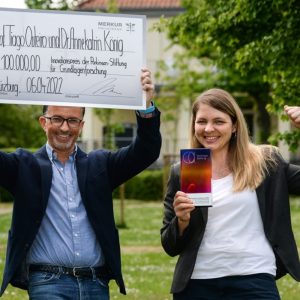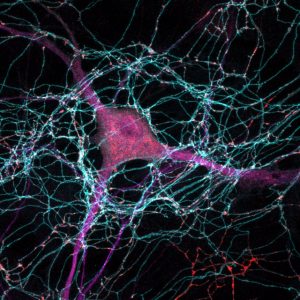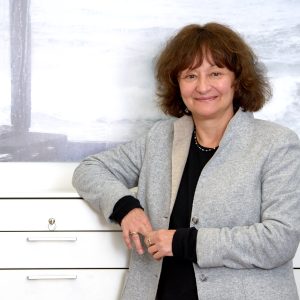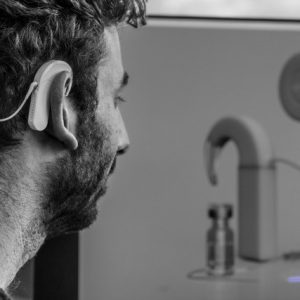31.05.2022
Authors Elizarova S, Chouaib A, Shaib A, Hill B, Mann F, Brose N, Kruss S, Daniel JA Journal PNAS Citation Proc Natl Acad Sci U S A. 2022 May 31;119(22):e2202842119. Abstract The neurotransmitter dopamine controls normal behavior and dopaminergic dysfunction is prevalent in multiple brain diseases. To reach a detailed
31.05.2022
Tiago Outeiro and Annekatrin König receive Parkinson’s Foundation Innovation Award
The “Parkinson Foundation” honors scientists of the University Medical Center Göttingen for their project proposal “Glycation of alpha-synuclein as biomarker” with the Innovation Award in the category “Basic Research”. The Innovation Prize is endowed with 100 000 euros. Dr. Annekatrin König, research associate, and Prof. Dr. Tiago Fleming Outeiro, MBExC
27.05.2022
Oct4 differentially regulates chromatin opening and enhancer transcription in pluripotent stem cells
Authors Xiong L, Tolen EA, Choi J, Velychko S, Caizzi L, Velychko T, Adachi K, MacCarthy CM, Lidschreiber M, Cramer P, Schoeler HR Journal eLife Citation eLife 11:e71533. Abstract The transcription factor Oct4 is essential for the maintenance and induction of stem cell pluripotency, but its functional roles are not
27.05.2022
Dopamine nanosensors measure signaling between nerve cells
Göttingen researchers succeeded in measuring the release of the neurotransmitter dopamine from nerve cells with unprecedented accuracy. This enables scientists to study the mechanisms that control dopamine signaling in more detail and to better elucidate the development of related diseases. Link to the MPI-NAT press release (in German)
27.05.2022
Remote control of the heart and beyond
Authors Zimmermann WH Journal Science Citation Science. 2022 May 27;376(6596):917-918. Abstract A resorbable closed-loop sensor-actuator implant can temporarily control heart rate. DOI 10.1126/science.abq0605 Pubmed Link
26.05.2022
Excited state lifetime modulation in semiconductor nanocrystals for super-resolution imaging
Authors Ghosh S, Hollingsworth JA, Gallea JI, Majumder S, Enderlein J, Chizhik AI Journal Nanotechnology Citation Nanotechnology. 2022 Jun 15;33(36). Abstract We report on proof of principle measurements of a concept for a super-resolution imaging method that is based on excitation field density-dependent lifetime modulation of semiconductor nanocrystals. The prerequisite
25.05.2022
Electrically Controlling and Optically Observing the Membrane Potential of Supported Lipid Bilayers
Authors Yudovich S, Marzouqe A, Kantorovitsch J, Teblum E, Chen T, Enderlein J, Miller EW, Weiss S Journal Biophysical Journal Citation Biophys J. 2022 May 25:S0006-3495(22)00430-1 Abstract Supported lipid bilayers are a well-developed model system for the study of membranes and their associated proteins, such as membrane channels, enzymes, and
24.05.2022
Noonan syndrome: DFG funds research into new treatment options
The German Research Foundation (Deutsche Forschungsgemeinschaft, DFG) is funding research into personalised treatment options for Noonan syndrome in the Stem Cell Unit at the University Medical Center Göttingen (UMG) with 467,580 euros. The team led by MBExC member Dr Lukas Cyganek will conduct research for three years on the topic
24.05.2022
Marina Rodnina elected to the National Academy of Sciences
The academy honors the director at the Max-Planck-Institute of Multidisciplinary Sciences and MBExC member with the admission as a Foreign Member for her innovative research on the structure and function of ribosomes – the protein factories of cells. Link to the press release of the MPI-NAT (in German)
20.05.2022
The first light-controlled drug that could improve the hearing of people with cochlear implants
Researchers at the University Medical Center Göttingen and the Institute for Bioengineering of Catalonia (IBEC) in Spain achieve, for the first time, in vivo light-activated auditory stimulation without the need for genetic manipulation. This new light-controlled drug, capable of triggering the neural pathways involved in hearing, can contribute to improving







